
Giovanni Giorgio Moroder is an Italian composer and music producer. Dubbed the "Father of Disco", Moroder is credited with pioneering euro disco and electronic dance music. His work with synthesizers had a large influence on several music genres such as Hi-NRG, Italo disco, synth-pop, new wave, house and techno music.

"Take My Breath Away" is a song written by Giorgio Moroder and Tom Whitlock for the 1986 film Top Gun, performed by American new wave band Berlin. It won the Academy Award for Best Original Song as well as the Golden Globe Award for Best Original Song in 1986.

"MacArthur Park" is a song written by American singer-songwriter Jimmy Webb that was recorded first by Irish actor and singer Richard Harris in 1968. Harris's version peaked at number two on the Billboard Hot 100 chart and number four on the UK Singles Chart. "MacArthur Park" was subsequently covered by numerous artists, including a 1970 Grammy-winning version by country music singer Waylon Jennings and a number one Billboard Hot 100 disco arrangement by Donna Summer in 1978. Webb won the 1969 Grammy Award for Best Arrangement Accompanying Vocalist(s) for the Richard Harris version.
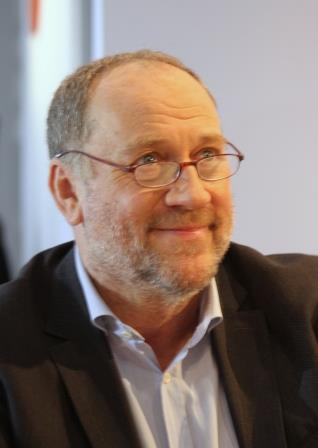
Hans Hugo Harold Faltermeyer is a German musician, composer and record producer.
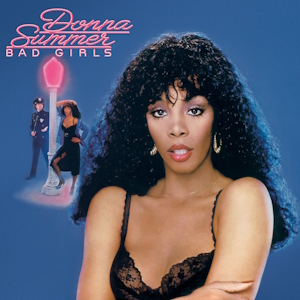
Bad Girls is the seventh studio album by American singer-songwriter Donna Summer. It was released on April 25, 1979, by Casablanca Records. Originally issued as a double album, Bad Girls became the best-selling and most critically acclaimed album of Summer's career. It was also her final studio album for Casablanca Records. In 2003, Universal Music re-issued Bad Girls as a digitally remastered and expanded deluxe edition.

"Call Me" is a song by the American new wave band Blondie and the theme to the 1980 film American Gigolo. Produced and composed by Italian musician Giorgio Moroder, with lyrics by Blondie singer Debbie Harry, the song appeared in the film and was released in the United States in early 1980 as a single. "Call Me" was No. 1 for six consecutive weeks on the Billboard Hot 100 chart, where it became the band's biggest single and second No. 1. It also hit No. 1 in the UK and Canada, where it became their fourth and second chart-topper, respectively. In the year-end chart of 1980, it was Billboard's No. 1 single and RPM magazine's No. 3 in Canada.
Jam & Spoon were a German electronic music duo formed in 1991 in Frankfurt. The group consisted of composers and producers Rolf Ellmer and Markus Löffel. They also worked under the pseudonyms Tokyo Ghetto Pussy, Storm and Big Room. Under these pseudonyms, the credits on the albums are listed as Trancy Spacer and Spacy Trancer.

"Right in the Night (Fall in Love with Music)" is a song by German electronic music duo Jam & Spoon, released by JAM! and Dance Pool as the second single from the duo's second album, Tripomatic Fairytales 2001 (1993). It is a Eurodance song with elements from progressive and vocal trance. It is based on "Leyenda" by the classical composer Isaac Albéniz and features vocals by American vocalist Plavka, with lyrics by Nosie Katzmann. The flamenco-styled riff in the song is played by duo member Jam El Mar, who was trained as a classical guitarist.

Love to Love You Baby is the second studio album by American singer Donna Summer, released on August 27, 1975, and her first to be released internationally and in the United States. Her previous album Lady of the Night (1974) was released only in the Netherlands. The album was commercially successful, mainly because of the success of its title track, which reached number 2 on the US Pop charts despite some radio stations choosing not to play the song due to its sexually explicit nature.

"I Feel Love" is a song by the American singer Donna Summer. Produced and co-written by Giorgio Moroder and Pete Bellotte, it was recorded for Summer's fifth studio album, I Remember Yesterday (1977). The album concept was to have each track evoke a different musical decade; for "I Feel Love", the team aimed to create a futuristic mood, employing a Moog synthesizer.

"Last Dance" is a song by American singer Donna Summer from the soundtrack album to the 1978 film Thank God It's Friday. It was written by Paul Jabara, co-produced by Summer's regular collaborator Giorgio Moroder and Pete Bellotte, and mixed by Grammy Award-winning producer Stephen Short, whose backing vocals are featured in the song.

Live and More is the first live album recorded by American singer-songwriter Donna Summer, and it was her second double album, released on August 28, 1978 by Casablanca Records. The live concert featured on the first three sides of this double album was recorded in the Universal Amphitheater, Los Angeles, California in 1978.
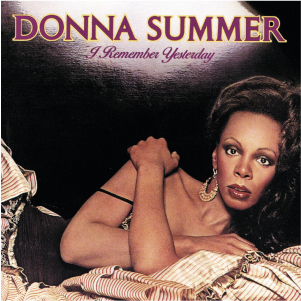
I Remember Yesterday is the fifth studio album by American singer-songwriter Donna Summer. It was released on May 13, 1977, seven months after the release of her previous album. Like her previous three albums, it was a concept album, this time seeing Summer combining the recent disco sound with various sounds of the past. I Remember Yesterday includes the singles "Can't We Just Sit Down ", "I Feel Love", the title track, "Love's Unkind" and "Back in Love Again". "I Feel Love" and "Love's Unkind" proved to be the album's most popular and enduring hits, the former of which came to be one of Summer's signature songs.

"On the Radio" is a song by American singer-songwriter Donna Summer, produced by Italian musician Giorgio Moroder, and released in late 1979 on the Casablanca record label. It was written for the soundtrack to the film Foxes and included on Summer's first international compilation album On the Radio: Greatest Hits Volumes I & II.
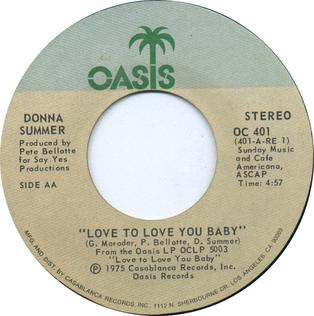
"Love to Love You Baby" is a song by American singer Donna Summer from her second studio album, Love to Love You Baby (1975). Produced by Pete Bellotte, and written by Italian musician Giorgio Moroder, Summer, and Bellotte, the song was first released as a single in the Netherlands in June 1975 as "Love to Love You" and then released worldwide in November 1975 as "Love to Love You Baby". It became one of the first disco hits to be released in an extended form.

American Gigolo is the soundtrack album to the 1980 film of the same name, starring Richard Gere and Lauren Hutton. The music was composed and performed by Italian musician Giorgio Moroder and was released worldwide on the Polydor label. It peaked at #7 on the Billboard 200 album chart. All the cuts from the soundtrack also went to number two for five weeks on the disco/dance charts.

"The Number One Song in Heaven" is a disco song by the American rock duo Sparks. Released as a single in 1979, the song was produced and co-written by electro-disco producer Giorgio Moroder. It became a top 20 hit in the UK, where it peaked at number 14. In addition to the standard black vinyl, both the 7" and 12" versions of the single were issued in a variety of coloured vinyl releases.

"Meet Me Half Way" is a song by American singer Kenny Loggins written by Giorgio Moroder and Tom Whitlock for the film Over the Top. It also appears as the final track on his sixth studio album Back to Avalon. It was his sixth soundtrack single and also his 13th Top 40 single, peaking at number 11, while it was more successful on the Adult Contemporary chart, peaking at number two.

"Déjà Vu" is a song by Italian disc jockey producer Giorgio Moroder, featuring vocals from Australian singer Sia. The song is the third single on Moroder's 2015 album, Déjà Vu. It was released on 17 April 2015, as a digital download via iTunes.
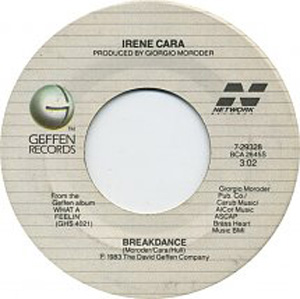
"Breakdance" is a song written by Giorgio Moroder, Bunny Hull, and the song's performer, Irene Cara. Moroder's obsession with the dance hit "Rockit" by Herbie Hancock fueled his composition of the music, and Cara was inspired by the street performers she saw growing up in the South Bronx to write lyrics about what was then called breakdancing. Released in March 1984, it was the third single that originated on her What a Feelin' LP and her first to make the top ten in the US since the album's title track went to number one almost a year earlier. "Breakdance" also charted in several other countries and had a dance remix that was also well received.



















